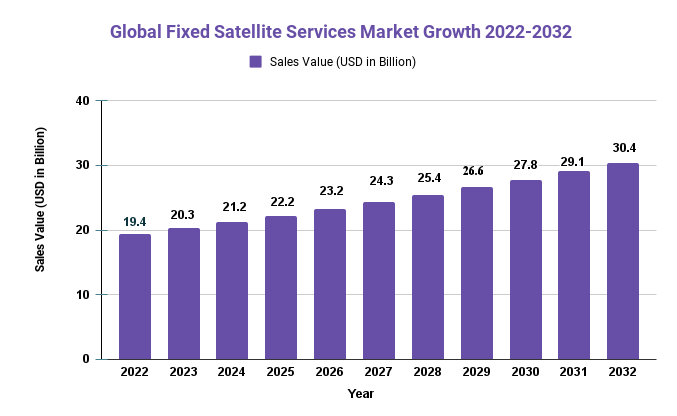Fixed Satellite Services Market Size Worth USD 30.4 Bn by 2032

Page Contents
Market Overview
The Fixed Satellite Services (FSS) market refers to the use of satellites for providing various telecommunications services to consumers, governments and businesses. FSS can be utilized for voice, video and data transmission such as broadcasting, broadband access and mobility solutions.
Global Fixed Satellite Services Market size is forecast to reach USD 30.4 Bn by 2032 from USD 19.4 Bn in 2022, growing at a compound annual growth rate (CAGR) of 4.60% between 2023 and 2032.
The Fixed Satellite Services (FSS) market offers satellite communication solutions for various applications, such as broadcasting, enterprise network, military/government operations and telecommunications services.
Geographically, North America is expected to dominate the FSS market due to the high adoption of satellite communication services in this region. Asia-Pacific is projected to experience the highest compound annual growth rate during this forecast period due to increasing demand for satellite services in emerging economies such as India and China.
Some of the leading players operating in the FSS market include SES S.A., Intelsat S.A., Eutelsat Communications S.A., Telesat Canada and Hispasat. To expand their market presence and offer innovative satellite communication services they are engaging in strategic partnerships, collaborations and acquisitions.

Drivers, trends, and challenges have an impact on market dynamics, which can impact businesses. Request for PDF sample report
Key Takeaways
- The global FSS market is projected to expand at an impressive clip due to rising demand for high-speed internet and communication services.
- North America currently leads the FSS market, followed by Europe and Asia Pacific.
- Commercial sector is the biggest end-user segment for FSS, followed by government and military.
Ku-band frequency band is most often utilized for FSS, followed by C-band and Ka-band.
Regional Snapshot
- North America dominates the FSS market due to the presence of major players and high demand for satellite services in both US and Canada.
- Europe: Holds a significant share in the FSS market due to an increasing demand for satellite services within the region and the presence of major satellite operators.
- Asia Pacific: Forecasts indicate significant growth for the FSS market due to rising demand for satellite services in emerging economies such as India and China.
Drivers
The Fixed Satellite Services (FSS) market is being driven by several factors. These include:
Demand for High-Speed and Reliable Connectivity: Globally, there is an increasing need for high-speed and dependable connectivity – particularly in remote or underserved areas. Fixed satellite service providers (FSSs) are capitalizing on their satellite communication infrastructure to offer connectivity solutions for various applications such as enterprise networks, broadband services, and mobile backhaul.
Growing Adoption of Advanced Technologies: With the rapid advancements in technology, the FSS market is seeing an uptick in demand for services such as HD broadcasting, 5G backhaul and Internet of Things (IoT) connectivity. FSS providers are adapting and investing in new technologies to keep up with their customers' rising demands.
Satellite services are becoming more in-demand in emerging economies such as Asia-Pacific, Latin America, and Africa, due to a lack of terrestrial communication infrastructure in many places. The Fixed Satellite System (FSS) market is well positioned to offer connectivity solutions in these areas – fuelling growth throughout these regions.
Restraints
Although there are numerous drivers driving growth in the Fixed Satellite Services (FSS) market, there are also some significant restraints that could limit its expansion:
High Initial Investment and Operating Costs: FSS providers require substantial capital expenditure for satellite infrastructure, ground stations, and other equipment. As a result, new entrants may find it challenging to establish themselves in the market due to high entry barriers.
FSS Market Faces Intense Competition from Other Communication Technologies: The FSS market faces intense competition from other communication technologies such as fiber optic cables, microwave links, and cellular networks. These may offer faster and cheaper communication solutions in certain areas, which may limit demand for FSS services.
Spectrum Availability and Regulatory Matters: FSS providers require access to enough spectrum for their services, however this allocation is subject to regulation, so any changes in regulatory frameworks could impact spectrum availability, potentially restricting growth in the FSS market.
Security Concerns: As satellite communication is vulnerable to interception, data breaches and cyber-attacks, there are concerns about the security of FSS services. These worries could restrict their adoption in industries requiring secure communication mechanisms.
Opportunities
The Fixed Satellite Services (FSS) market may present several growth prospects over the coming years:
Expansion of 5G and IoT networks: The proliferation of 5G and IoT networks is expected to drive demand for FSS services, as these networks need high-speed, dependable connectivity. FSS providers can utilize their satellite infrastructure to offer connectivity solutions for these emerging networks.
Growth of the Connected Car Market: The connected car market is expected to experience rapid growth over the coming years, driven by increasing demand for in-car entertainment and communication services. Fixed satellite services (FSSs) can offer high-speed, dependable connectivity in remote areas, further improving consumers' experiences when riding.
Increasing Demand for Mobility Solutions: FSS providers offer mobility solutions across a range of applications such as maritime, aviation and ground transportation. These solutions offer connectivity for communication, navigation and entertainment – further increasing the demand for FSS services.
Development of High-Throughput Satellite (HTS) Technology: HTS technology is expected to drive growth in the Fixed Satellite Service (FSS) market as these satellites offer higher bandwidth and better connectivity than traditional FSS services. HTS technology is particularly suitable for enterprise networks, broadband services, and mobile backhaul applications.
Challenges
The Fixed Satellite Services (FSS) market faces several obstacles that could negatively affect its growth prospects in the years ahead:
High Cost of Equipment and Infrastructure: The FSS market requires substantial investments in satellite infrastructure, ground stations, and other necessary items. As a result, new entrants may find it difficult to break into this competitive space due to the high entry barrier.
Competition from Terrestrial Communication Technologies: The FM broadcasting (FSS) market faces competition from terrestrial communication technologies like fiber optic cables, microwave links and cellular networks. While these may offer faster and cheaper solutions in certain areas, they could reduce demand for FM services.
Regulatory Challenges: For FSS providers, regulatory hurdles lie in spectrum allocation, licensing and compliance. Any changes to regulatory frameworks could impact spectrum availability and constrain growth within the FSS market.
Security Concerns: Given that satellite communication is vulnerable to interception, data breaches and cyber-attacks, security concerns exist about FSS services. These worries could hinder adoption of FSS technologies, particularly in industries that require secure communication.
Environmental Challenges: The FSS market faces environmental difficulties such as space debris and atmospheric interference that could negatively affect satellite performance and reliability. These obstacles could reduce the quality of service provided by FSS providers, potentially hindering their expansion within the market.
Recent Developments
- On February 2021, Viasat launched its second ViaSat-3 satellite, expected to significantly boost the company's broadband capacity.
- In December 2020, SES launched its first low Earth orbit (LEO) satellite, further strengthening the company's global connectivity capabilities.
- In September 2020, Inmarsat launched the GX5 satellite, expected to significantly enhance their capacity for providing high-speed broadband services.
Key Market Segments
Type
- Wholesale Services
- Managed Services
Application
- Government
- Military Orgization
- Small and Large Enterprises
- End-Users
Key Market Players
- SES
- Intelsat
- Eutelsat Communications
- Telesat
- SKY Perfect JSAT
- SingTel Optus
- Star One
- Arabsat
- Hispasat
- AsiaSat
- Thaicom
- Russia Satellite Communication
- China Satellite Communications
Report Scope
| Report Attribute | Details |
| The market size value in 2022 | USD 19.4 Bn |
| Revenue forecast by 2032 | USD 30.4 Bn |
| Growth Rate | CAGR Of 4.60% |
| Regions Covered | North America, Europe, Asia Pacific, Latin America, and Middle East & Africa, and Rest of the World |
| Historical Years | 2017-2022 |
| Base Year | 2022 |
| Estimated Year | 2023 |
| Short-Term Projection Year | 2028 |
| Long-Term Projected Year | 2032 |
Frequently Asked Questions
Q: What is Fixed Satellite Services (FSS)?
A: FSS refers to the use of satellites for providing various telecommunications services to consumers, governments, and businesses.
Q: What is the global FSS market size?
A: The global FSS market was valued at USD 20.1 billion in 2020 and is expected to reach USD 26.9 billion by 2026.
Q: What are the key drivers of the FSS market?
A: The key drivers of the FSS market include increasing demand for high-speed internet and communication services, growing need for reliable and efficient communication services in remote areas, and growing demand for FSS from the defense and military sectors.
Q: What are the major challenges faced by the FSS market?
A: The major challenges faced by the FSS market include strict regulations and licensing requirements for operating FSS, vulnerability to interference and cyber attacks, and limited availability of frequency bands for FSS
The team behind market.us, marketresearch.biz, market.biz and more. Our purpose is to keep our customers ahead of the game with regard to the markets. They may fluctuate up or down, but we will help you to stay ahead of the curve in these market fluctuations. Our consistent growth and ability to deliver in-depth analyses and market insight has engaged genuine market players. They have faith in us to offer the data and information they require to make balanced and decisive marketing decisions.